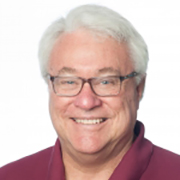Since he arrived at Georgia Tech in 1985, Christopher Hertzog has spent most of his time studying what happens to memory and cognition as people age. Can high-level thinkers maintain that status as they grow old? Can the very fear of aging impact cognitive performance?
Such research into the adult aging brain has earned the School of Psychology professor the 2019 Behavioral and Social Sciences Section Distinguished Career Contribution in Gerontology Award from the Gerontological Society of America (GSA).
According to the GSA website, the award is presented annually to "an individual whose contributions over the course of his or her career have articulated a novel theoretical or methodological perspective or synthesis that addresses a significant problem in the literature." This distinction comes with a commemorative plaque, as well as recognition in GSA’s Gerontology News publication. The award will be presented at the GSA’s Annual Scientific Meeting on Nov. 13-17, 2019, in Austin.
“I am truly grateful for this acknowledgement of my research program by the Gerontological Society of America, the most prestigious multidisciplinary society devoted to basic and applied science about aging and its consequences," Hertzog says. "It means a lot to me that my peers evaluate my contributions so highly, and that I’ve been able to participate in advancing a field of such profound societal relevance given that the dramatic greying of the U.S. population is projected to continue into the 21st century."
The GSA award recognizes Hertzog’s work evaluating how aging affects intelligence, cognition, and metacognition. His published empirical work has emphasized the assessment of individual differences in cognitive development, often using structural equation models to capture predictors of individual differences in measured cognitive change. He has shown that there is high stability of individual differences in cognitive traits – for example, high-ability people preserve their relative status into old age – but that there are also subtle but reliable individual differences in rates of cognitive change from midlife to old age.
Hertzog has also shown that people’s beliefs about how much they are aging can be highly inaccurate and distorted by anxiety and fears about aging, and that these beliefs can impair their cognitive task performance. He has studied how some aspects of cognition, including metacognitive monitoring (whether people can accurately describe their own mental states) are relatively spared by aging. That can serve as an effective basis for interventions and can help people compensate for age-related memory declines.
"We need to figure out how to optimize older adults’ functional effectiveness and vital longevity, and we’re making progress," Hertzog says. "I’ve been blessed to be able to collaborate on several major projects in the field, and I owe a debt of thanks to a number of mentors, friends, and collaborators – faculty, postdocs, students – who contributed to this research program, both here at Georgia Tech and elsewhere. Georgia Tech has been a wonderful context for my academic career, and I could not have accomplished what I have without the support I’ve received over the years.”
Hertzog received his Ph.D. in psychology, with an emphasis on adult development and aging, from the University of Southern California. After a two-year postdoctoral fellowship at the University of Washington, he accepted an entry-level tenure-track position at Pennsylvania State University in the Department of Human Development and Family Studies, where he served as a quantitative developmental methodologist. He was recruited to Georgia Tech in 1985 as an associate professor in the School of Psychology, where he is closing in on 35 years of service.
Hertzog serves as coordinator of the school's Ph.D. program in cognitive aging and is a past program director for the ongoing National Institutes of Health-funded Ruth L. Kirschstein training grant in cognitive aging. He is currently the coordinator of the biennial Cognitive Aging Conference, scheduled for spring 2020.
For More Information Contact
Renay San Miguel
Communications Officer
404-894-5209



